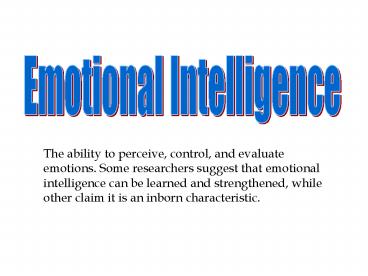Emotional Intellegence - PowerPoint PPT Presentation
Title:
Emotional Intellegence
Description:
The ability to perceive, control, and evaluate emotions. Some researchers suggest that emotional intelligence can be learned and strengthened, while other claim it is ... – PowerPoint PPT presentation
Number of Views:319
Avg rating:3.0/5.0
Title: Emotional Intellegence
1
Emotional Intelligence
The ability to perceive, control, and evaluate
emotions. Some researchers suggest that emotional
intelligence can be learned and strengthened,
while other claim it is an inborn characteristic.
2
- A lot of emphasis has been put on certain
aspects of intelligence such as logical
reasoning, math skills, spatial skills,
understanding analogies, verbal skills etc.
Researchers were puzzled by the fact that while
IQ could predict to a significant degree academic
performance and, to some degree, professional and
personal success, there was something missing in
the equation.
3
Who ?
- One of the major missing parts in the success
equation is emotional intelligence, a concept
made popular by the groundbreaking book by Daniel
Goleman and the research of John D. Mayer. - The founders of this concept found that for
various reasons and thanks to a wide range of
abilities, people with high emotional
intelligence tend to be more successful in life
than those with lower EIQ even if their classical
IQ is average.
4
Measuring Intelligence
- In regard to measuring emotional intelligence I
am a great believer that criterion-report (that
is, ability testing) is the only adequate method
to employ. Intelligence is an ability, and is
directly measured only by having people answer
questions and evaluating the correctness of those
answers. --John D. Mayer
5
The Importance
- John Gottman "In the last decade or so, science
has discovered a tremendous amount about the role
emotions play in our lives. Researchers have
found that even more than IQ, your emotional
awareness and abilities to handle feelings will
determine your success and happiness in all walks
of life, including family relationships."
6
How will it affect you?
- Today companies worldwide routinely look through
the lens of EQ in hiring, promoting, and
developing their employees. For instance, Johnson
and Johnson (another CREIO member) found that in
divisions around the world, those identified at
mid career as having high leadership potential
were far stronger in EI competencies than were
their less-promising peers.
7
The Emotions
Research reveals that that mastery of these
personal and interpersonal skills is the single
most important determinant of our performance
success. It is also a major determinant in how we
feel, think and act. Emotional Intelligence will
determine how well you know and manage yourself,
how well you handle what happens to you and how
well you interact and handle others.
8
Five Domains
- Emotional Self-Awareness - Know what you are
feeling and what your emotional state is, and
then using that information to help you make
effective decisions for better outcomes for
yourself and others. - Emotional Self-Regulation - Possessing the
ability to manage your emotional state and
control ones interpretations of external events.
The ability to choose how you feel and to be able
to alter stress states. - Emotional Self-Motivation - The ability to use
your emotions to create self action. Ones ability
to work though resistance, to commit and to
persist. Using your emotions to be positive,
optimistic and confident. - Empathy - The ability to listen effectively and
accurately enough to put yourself in the other
person's shoes. The ability to have perspective.
You may not necessarily agree with them, but can
understand the situation from their point of view
in order to improve communication,
problem-solving, and trust. - Managing Relationships - The ability to
cooperate, consider and show care for others,
appreciate difference and create win-win
outcomes.
9
Did you know?
- Emotional Intelligence is a learned skill.
- Research shows that emotional competencies are
controlled by a different part of the brain to
technical and cognitive skills. - Emotional Intelligence has been proven to be
twice as important as IQ for job performance. - The importance of emotional intelligence
increases as one climbs the career ladder. - Teams with high emotional intelligence as well as
skill are faster, more productive and more
innovative. - EQ allows teams to think more clearly under
pressure, are calmer and less stress as they
spend less energy on internal emotional turmoil. - Leaders with high emotional intelligence have
been rated the best bosses that talented people
want to work for. - Emotional intelligent work environments have less
turnover, adapt to change quicker and are more
innovative. - Emotional Intelligent organizations have less
customer complaints and increased customer trust
and loyalty.
10
Who needs EQ?
- Emotional Competence has everything to do with
acting SMART - having the skills to manage your
emotions to help you make choices in-the-moment
and have more effective control over yourself and
your impact on others.
11
Submitted by Marissa Uphaus,Resident
Assistant,Ball State University































